In the lovely venue that is The Piano, acoustically-designed to hear every small arpeggio played piano (that is the musical term for quietly), we assembled to celebrate the rich tradition of women's poetry in Aotearoa.
Firstly, Morrin Rout, the facilitator, quizzed Paula Green, editor of Wild Honey: Reading New Zealand Women's Poetry, about Paula's extraordinary contribution to Aotearoa literature and her blog, NZ Poetry Shelf, which champions poetry from these verdant shores. Asked where the title of the book came from, Paula answered that her partner was the painter, Michael Hight, known for his beehive paintings and so honey was part of the fabric of her world.
Paula explained how she came from a long line of women poets and that many of the earlier women poets had been denigrated because the poetry of the domestic was seen as an unimportant subject. But Paula explained how she had come of age in the 1960s and 1970s when the existing paradigms were being challenged. This applied to literature and poetry as much as to anything else.
Morrin made the observation that Paula seemed very invested in the poetry she had chosen for the book, making for an "idiosyncratic" editorship. Paula's response was that when she was reading poetry collections, "I take my whole body in". The poetry had to move her both in the head and the heart.
Paula spoke about her love of working with children and she recounted how they always ask her, "where do your ideas come from?" (I can certainly vouch for this as an evergreen question when I am doing any writing workshops with children or adults) When she paused to think about this question, Paula realised that ideas often come to her when engaged in domestic activities such as cooking. Women writers are often mothers and wives who "write around their domestic duties" and Paula viewed "reclaiming the domestic" as a poetic subject as valid as any other.
The format was for each poet to read one of their own poems and a poem by a women poet they admired. First up was a veteran of Aotearoa poetry, Cilla McQueen. Cilla had once said that "poetry leaves me in a state of never knowing what happens next". She read a poem by Ruth Dallas, who she felt had been ignored as a poet. The poem was inspired by a Victorian photograph and was called "Pioneer Woman with Ferrets". Then Cilla read two short poems, both about her friend, Joanna Paul, written about twenty years apart, one about visiting Joanna in Dunedin and the other about after she had died.
Jess Fiebig, whose debut collection, My Honest Poem, was published in August 2020, spoke about her two mentors, Frankie McMillan, who had tutored her at the School for Young Writers, and her grandmother who was 90 in two weeks and was now suffering from Alzheimers. She read her poem, "Divination", a tribute to her grandmother with "her hazel eyes following clouds". She also read a poem, "Not the Saddest Thing in the World", by American poet, Ada Limón, about the Covid-19 global situation.
Frankie McMillan, the mistress of flash fiction, whose wry humour permeates her recent collection, The Father of Octopus Wrestling, gave us a multi-generational prose poem, "The Winter Swimming of my Grandmother". It illustrated how the women in her family had both literally and figuratively swum against the tide. Her grandmother "swims serious", naked except for a hat to keep hypothermia at bay. She also read a poem by UK poet, Imtiaz Dharker, about a real life incident that had happened in London during a "frost fair" in February 1814. The poems was called "The Elephant is Walking on the River Thames".
Freya Daly Sadgrove, a poet and theatre-maker from Pōneke, whose debut collection, Head Girl, was published in February 2020, read her poem "Dystopia Novel with Me as the Central Character" and a poem by her good friend, Ursula Robinson-Shaw, who Freya said made her braver than she would be otherwise. The poem was called "Sonnet for the good meat".
Bernadette Hall read two "boisterous" sonnets from her collection, Fancy Dancing: New and Selected Poems 2004–2020. The first was inspired by encountering the musical term, "reprise", in a teaching/literature context. In music, a reprise is the repetition of the opening material later in a composition. This sonnet applied it to Hall's wish-fulfilment upon entering the afterlife. Her second sonnet was called "Here I Go Trying to Make a Deal with a Goddess". Hall then read a poem by her friend, Dinah Hawken, from Hawken's second collection, Small Stories of Devotion. Lastly, Hall paid tribute to Cilla McQueen who had initially urged hall to be a writer when Hall was pursuing a teaching career.
Last, but certainly not least, was Selina Tusitala Marsh, the Fast Talking PI herself. She opened with a new poem from her friend, Tusiata Avia's, latest collection, The Savage Coloniser Book. The poem was called "250th Anniversary of James Cook's Arrival in New Zealand" and it pulled no punches. Avia and her posse were searching for Cook and when they found him, they were going to "f**k you up." Then Marsh brought it full circle, back to the domestic with her poem about a stroppy puppy brought into her household who was lording it over the incumbent rescue dog, Tana. The poem was called "Aries Must Go or Two Dogs, One House".
All too soon, a pleasant hour in the company of these inspiring women had flown by and we spilled out into the Spring sunshine, our heads full of vibrant imagery.
All photographs by Andrew M. Bell.
WORD Christchurch
- Visit the WORD Christchurch website for the full programme of events
- View our page on WORD Christchurch Spring Festival 2020 for reports, articles, and interviews
- Folllow WORD Christchurch on:

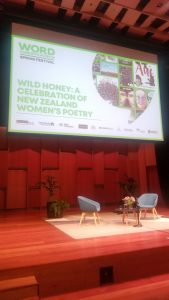
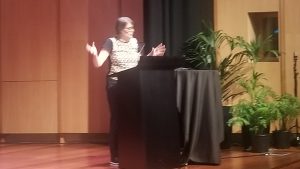
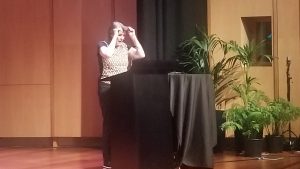
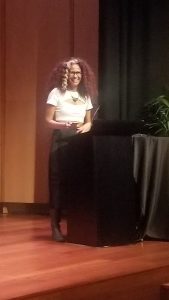
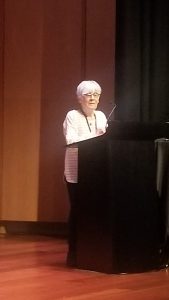
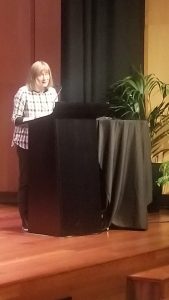
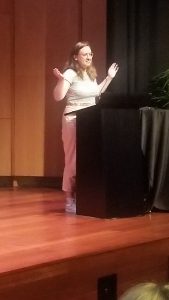
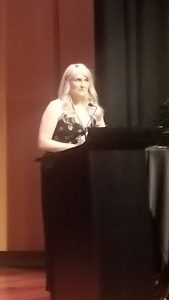
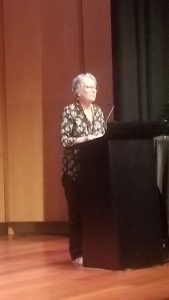

Add a comment to: WORD Christchurch 2020 – Wild Honey: A Celebration of New Zealand Women’s Poetry